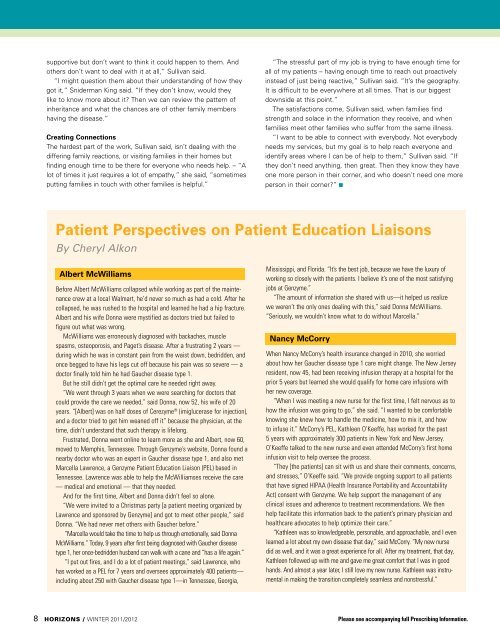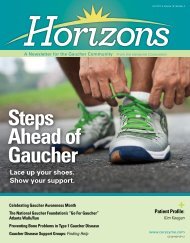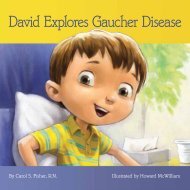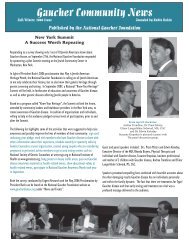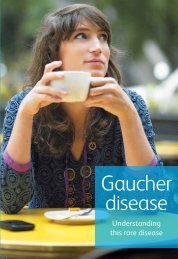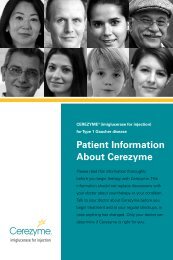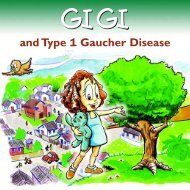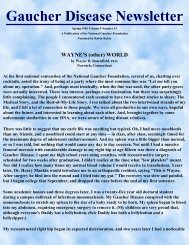Horizons Issue 3 2011 - National Gaucher Foundation
Horizons Issue 3 2011 - National Gaucher Foundation
Horizons Issue 3 2011 - National Gaucher Foundation
Create successful ePaper yourself
Turn your PDF publications into a flip-book with our unique Google optimized e-Paper software.
supportive but don’t want to think it could happen to them. And<br />
others don’t want to deal with it at all,” Sullivan said.<br />
“I might question them about their understanding of how they<br />
got it,” Sniderman King said. “If they don’t know, would they<br />
like to know more about it Then we can review the pattern of<br />
inheritance and what the chances are of other family members<br />
having the disease.”<br />
Creating Connections<br />
The hardest part of the work, Sullivan said, isn’t dealing with the<br />
differing family reactions, or visiting families in their homes but<br />
finding enough time to be there for everyone who needs help. – “A<br />
lot of times it just requires a lot of empathy,” she said, “sometimes<br />
putting families in touch with other families is helpful.”<br />
“The stressful part of my job is trying to have enough time for<br />
all of my patients – having enough time to reach out proactively<br />
instead of just being reactive,” Sullivan said. “It’s the geography.<br />
It is difficult to be everywhere at all times. That is our biggest<br />
downside at this point.”<br />
The satisfactions come, Sullivan said, when families find<br />
strength and solace in the information they receive, and when<br />
families meet other families who suffer from the same illness.<br />
“I want to be able to connect with everybody. Not everybody<br />
needs my services, but my goal is to help reach everyone and<br />
identify areas where I can be of help to them,” Sullivan said. “If<br />
they don’t need anything, then great. Then they know they have<br />
one more person in their corner, and who doesn’t need one more<br />
person in their corner”<br />
Patient Perspectives on Patient Education Liaisons<br />
By Cheryl Alkon<br />
Albert McWilliams<br />
Before Albert McWilliams collapsed while working as part of the maintenance<br />
crew at a local Walmart, he’d never so much as had a cold. After he<br />
collapsed, he was rushed to the hospital and learned he had a hip fracture.<br />
Albert and his wife Donna were mystified as doctors tried but failed to<br />
figure out what was wrong.<br />
McWilliams was erroneously diagnosed with backaches, muscle<br />
spasms, osteoporosis, and Paget’s disease. After a frustrating 2 years —<br />
during which he was in constant pain from the waist down, bedridden, and<br />
once begged to have his legs cut off because his pain was so severe — a<br />
doctor finally told him he had <strong>Gaucher</strong> disease type 1.<br />
But he still didn’t get the optimal care he needed right away.<br />
“We went through 3 years when we were searching for doctors that<br />
could provide the care we needed,” said Donna, now 52, his wife of 20<br />
years. “[Albert] was on half doses of Cerezyme ® (imiglucerase for injection),<br />
and a doctor tried to get him weaned off it” because the physician, at the<br />
time, didn’t understand that such therapy is lifelong.<br />
Frustrated, Donna went online to learn more as she and Albert, now 60,<br />
moved to Memphis, Tennessee. Through Genzyme’s website, Donna found a<br />
nearby doctor who was an expert in <strong>Gaucher</strong> disease type 1, and also met<br />
Marcella Lawrence, a Genzyme Patient Education Liaison (PEL) based in<br />
Tennessee. Lawrence was able to help the McWilliamses receive the care<br />
— medical and emotional — that they needed.<br />
And for the first time, Albert and Donna didn’t feel so alone.<br />
“We were invited to a Christmas party [a patient meeting organized by<br />
Lawrence and sponsored by Genzyme] and got to meet other people,” said<br />
Donna. “We had never met others with <strong>Gaucher</strong> before.”<br />
“Marcella would take the time to help us through emotionally, said Donna<br />
McWilliams.” Today, 9 years after first being diagnosed with <strong>Gaucher</strong> disease<br />
type 1, her once-bedridden husband can walk with a cane and “has a life again.”<br />
“I put out fires, and I do a lot of patient meetings,” said Lawrence, who<br />
has worked as a PEL for 7 years and oversees approximately 400 patients—<br />
including about 250 with <strong>Gaucher</strong> disease type 1—in Tennessee, Georgia,<br />
Mississippi, and Florida. “It’s the best job, because we have the luxury of<br />
working so closely with the patients. I believe it’s one of the most satisfying<br />
jobs at Genzyme.”<br />
“The amount of information she shared with us—it helped us realize<br />
we weren’t the only ones dealing with this,” said Donna McWilliams.<br />
“Seriously, we wouldn’t know what to do without Marcella.”<br />
Nancy McCorry<br />
When Nancy McCorry’s health insurance changed in 2010, she worried<br />
about how her <strong>Gaucher</strong> disease type 1 care might change. The New Jersey<br />
resident, now 45, had been receiving infusion therapy at a hospital for the<br />
prior 5 years but learned she would qualify for home care infusions with<br />
her new coverage.<br />
“When I was meeting a new nurse for the first time, I felt nervous as to<br />
how the infusion was going to go,” she said. “I wanted to be comfortable<br />
knowing she knew how to handle the medicine, how to mix it, and how<br />
to infuse it.” McCorry’s PEL, Kathleen O’Keeffe, has worked for the past<br />
5 years with approximately 300 patients in New York and New Jersey.<br />
O’Keeffe talked to the new nurse and even attended McCorry’s first home<br />
infusion visit to help oversee the process.<br />
“They [the patients] can sit with us and share their comments, concerns,<br />
and stresses,” O’Keeffe said. “We provide ongoing support to all patients<br />
that have signed HIPAA (Health Insurance Portability and Accountability<br />
Act) consent with Genzyme. We help support the management of any<br />
clinical issues and adherence to treatment recommendations. We then<br />
help facilitate this information back to the patient’s primary physician and<br />
healthcare advocates to help optimize their care.”<br />
“Kathleen was so knowledgeable, personable, and approachable, and I even<br />
learned a lot about my own disease that day,” said McCorry. “My new nurse<br />
did as well, and it was a great experience for all. After my treatment, that day,<br />
Kathleen followed up with me and gave me great comfort that I was in good<br />
hands. And almost a year later, I still love my new nurse. Kathleen was instrumental<br />
in making the transition completely seamless and nonstressful.”<br />
8 <strong>Horizons</strong> / Winter <strong>2011</strong>/2012 Please see accompanying full Prescribing Information.


